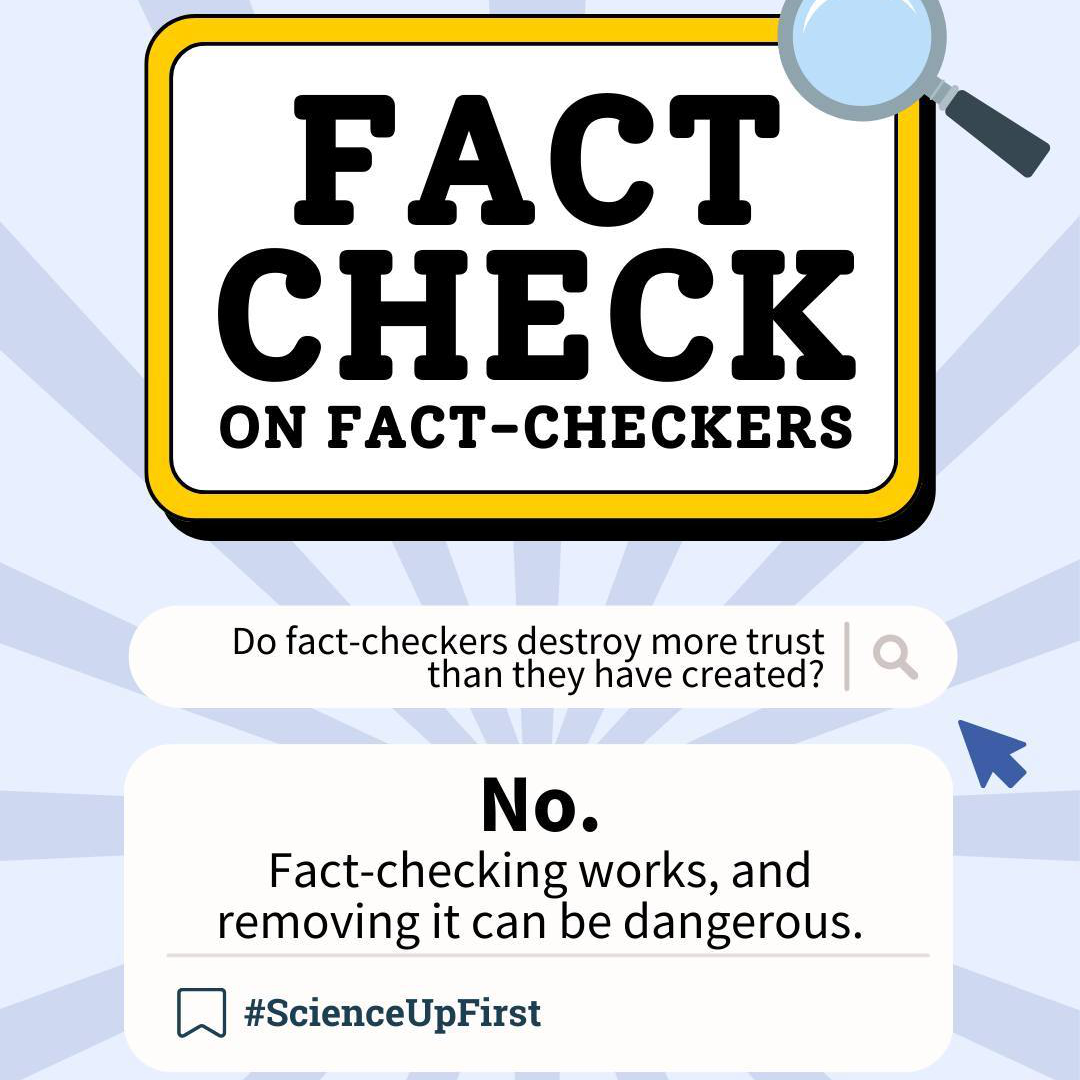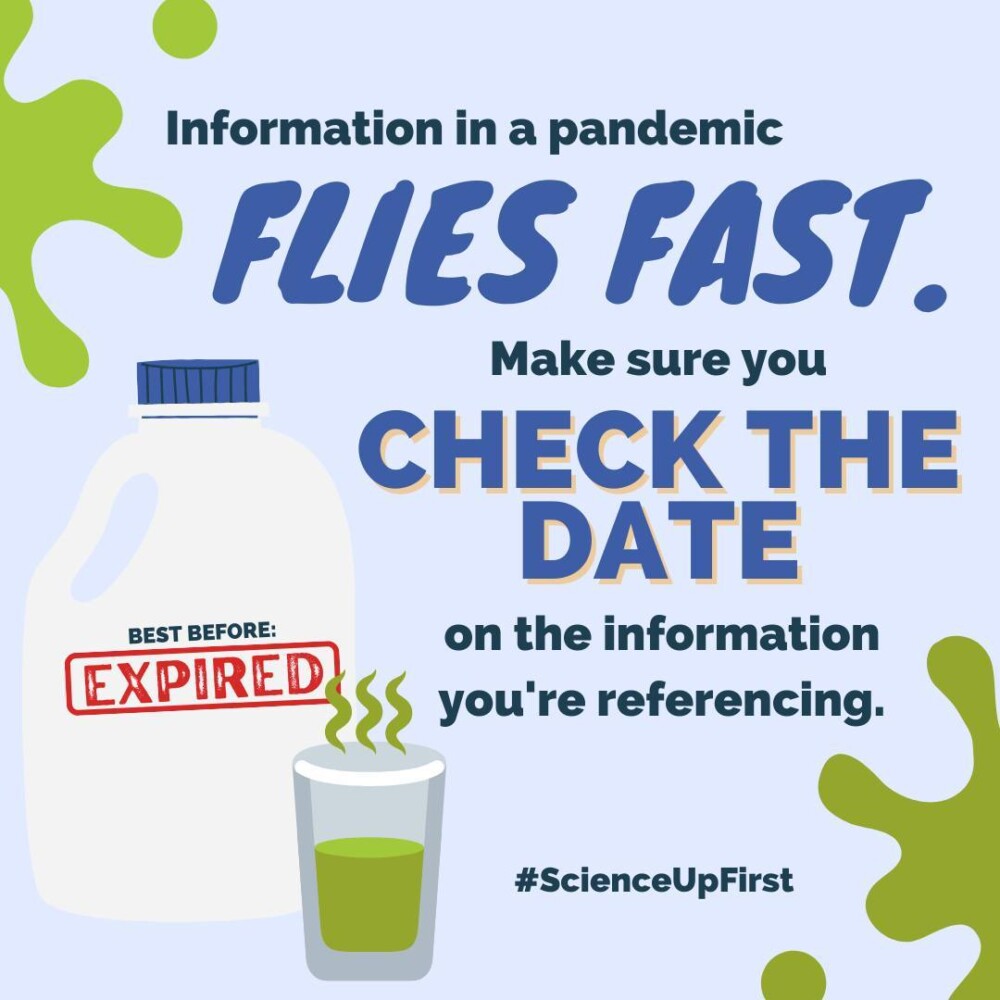
Not to get all “meta” but we need a fact check on fact checkers ✅
In an announcement made on January 7th, Meta CEO, Mark Zuckerberg, announced an end to fact-checking across their platform. In a video he stated that fact-checkers had “destroyed more trust than they have created”, but is there evidence to support this?
Not at all! On the contrary, there is measurable evidence that fact-checkers work! Fact-checking reduces the belief in and spread of misinformation, even among those who don’t trust the fact-checkers (1-7).
Removal of these policies can cause harm, so now more than ever it’s good to up our critical thinking game – here are 2 things to remember:
- Pause to think and ask yourself “Is this true?” before sharing. This is a simple proven way of slowing the spread of misinformation (8-12).
- Fact check for yourself, it’s easier than you think! Confirm the credibility of a source by searching through credible sources in another tab and comparing it to the original source. Fact-checkers call this “lateral reading” (13-19).
Fact-checking isn’t just for experts – it’s skills we can all use to evaluate claims and spot misinformation.
- Warning labels from fact checkers work — even if you don’t trust them | MIT Sloan | September 2024
- Fact-checker warning labels are effective even for those who distrust fact-checkers | Nature Human Behaviour | September 2024
- The global effectiveness of fact-checking: Evidence from simultaneous experiments in Argentina, Nigeria, South Africa, and the United Kingdom | PNAS | September 2021
- Misinformation warning labels are widely effective: A review of warning effects and their moderating features | Current Opinion in Psychology | December 2023
- Political Misinformation and Factual Corrections on the Facebook News Feed: Experimental Evidence | The Journal of Politics | July 2022
- Cleaning Up Social Media: The Effect of Warning Labels on Likelihood of Sharing False News on Facebook | Policy & Internet | July 2019
- Journalistic interventions matter: Understanding how Americans perceive fact-checking labels | HKS Misinformation Review | April 2024
- Fighting misinformation: Why pausing before you share really works! | MediaSmarts | April 2022
- Accuracy prompts are a replicable and generalizable approach for reducing the spread of misinformation | Nature Communications | April 2022
- Understanding and combatting misinformation across 16 countries on six continents | Nature Human Behaviour | June 2023
- Shifting attention to accuracy can reduce misinformation online | Nature | March 2021
- Fighting COVID-19 Misinformation on Social Media: Experimental Evidence for a Scalable Accuracy-Nudge Intervention | Association for Psychological Science | June 2020
- What is lateral reading?
- Expand your view with lateral reading
- Lateral Reading and SIFT – Online Research | Libraries Central Michigan University | December 2024
- Lateral Reading: Reading Less and Learning More When Evaluating Digital Information | Teachers College Record | November 2019
- Teaching lateral reading: Interventions to help people read like fact checkers | Current Opinion in Psychology | February 2024
- Lateral reading on the open Internet: A district-wide field study in high school government classes | APA PsycNet Direct | July 2022
- Teaching lateral reading: Interventions to help people read like fact checkers | Current Opinion in Psychology | February 2024
Share our original Tweet!
Fact-checking isn't just for experts – it's a skill everyone can use to evaluate claims and spot misinformation.
— ScienceUpFirst | LaScienced'Abord (@ScienceUpFirst) January 30, 2025
Read here to find out more 👉https://t.co/UMKvjBynYN#ScienceUpFirst pic.twitter.com/i6uDUgCLv6
View our original Instagram Post!




